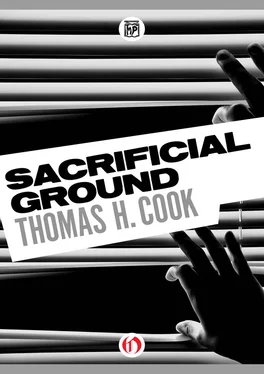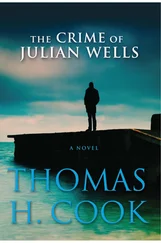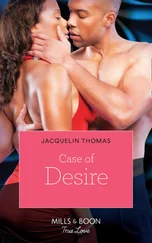“Where is he?” Frank asked.
“The rotunda.”
“Go get him,” Frank said.
“Mr. Curtis don’t like to be disturbed when he’s working,” the man said.
Frank snapped his hand up to the badge and ripped it off the coat.
“Hey, man!” the guard cried.
Frank tossed the badge onto the floor. “Don’t get the idea that little piece of tin means anything. You can buy them at a toy store.”
The guard fingered the rip in his coat. “They’re going to shit when they see this, man.”
Frank grabbed one of the large buttons on the guard’s coat and tugged down on it. “How do I get to the rotunda?” he asked.
The man glared at him helplessly. “Just go through the room behind me, and then through them double doors.”
Frank let go of the button, then stepped around the desk and walked through the double doors of the rotunda.
It was very large and very dark. He could see the terrible fury of the battle of Atlanta as it spread out in miniature before him, a vision of desperate struggle in the smoking ruin of the South’s premier city. He could almost feel the heat of the flames, hear the roar of the cannon. An air of pain and terror hung over the display, loss and grief like a black shroud in the tiny trees.
“May I help you, sir?”
The voice came from a tall, slightly stooped man who stood next to one of the models, a Union soldier almost half his size.
“I’m looking for David Curtis,” Frank said.
“I am David Curtis,” the man replied.
“On the sign outside, it says that you’re in charge of the Cyclorama restoration.”
“Yes, I am,” Curtis said. “But if you’re looking for work, I’m afraid that all of our positions are filled.”
“I’m not looking for work,” Frank told him. He pulled out his badge.
Curtis leaned forward slightly. “What’s that you’re holding?” he said. “In this light, and with my eyes …”
Frank stepped over to him. “Frank Clemons. Police.”
The man squinted at the badge. “Oh, yes.” He walked a few feet away and hit a switch. A steely gray light suddenly flooded the rotunda. “That’s better, don’t you think?”
Frank nodded.
Curtis walked back over to him. “Now, what is all this about the police?”
“I’m investigating a murder,” Frank said. As he glanced around, he realized that he was standing almost in the dead center of the battle. It seemed to rage ferociously below him, a world of smoking air and exploded buildings, horrifying even in miniature.
“Odd, isn’t it?” Curtis said quietly.
“What?”
“This place.”
“Yes, a little.”
“Sometimes I feel like ducking quickly, to avoid a musket ball that’s hurtling toward me.”
It was a landscape of hellish misery, and as Frank’s eyes lingered on it, the misery itself seemed to gather around him in a cloud. It was as if every streak of pain and cry of grief had been collected in this room, all the folly of a million years suddenly rolled into one heartbreaking ball.
“My God,” he whispered.
Curtis looked at him curiously. “You’ve never been here, have you?”
“No.”
“Most people see it from up in the stands,” Curtis said. “It’s quite different when you’re down here.” He tugged Frank gently by the arm. “Come, we’ll go to my office now.”
Frank followed him slowly into a small room at the rear of the rotunda. It was cluttered with tiny figures of soldiers and military equipment, tiny flags fluttering in an invisible wind, patches of smoldering earth, stands of burning trees.
Curtis sat down behind his desk. “Now, you said something about a murder?”
“Yes,” Frank said. “A young woman.” He handed Curtis the picture of Angelica. “Her.”
Curtis brought the photograph very close to his eyes. “I broke my glasses yesterday,” he explained. “I’ll have a new pair by this afternoon. But for now, I’m a bit handicapped.”
“Do you recognize her?” Frank asked.
Curtis shook his head. “No. Who is she?”
“Angelica Devereaux.”
“Oh, yes, it was in the paper a few days ago.”
“That’s right,” Frank said. “Her body was found not too far from here.”
“Really? I thought the paper said that it was found off Glenwood.”
“You have a very good memory,” Frank said.
“Yes, I do.” Curtis handed the picture back to Frank. “Was the paper wrong?”
“No,” Frank told him, “but I’ve been tracing her movements in the days before her death. One night, she came here.”
Curtis looked surprised. “Here? But the Cyclorama is closed until the restoration is finished. She wouldn’t have been able to get in.”
“She didn’t come into the building,” Frank said. “She parked in the lot outside.”
Curtis smiled quietly. “Oh, I see. Well, that’s not unusual. The park is open to everyone. That’s the way it should be.” He looked at Frank pointedly. “You, of all people, should know that recently the parks have been taken over by the less wholesome element of the city.” He smiled cheerfully. “But now we’re taking them back. It’s happening all over. New York City. Boston. Everywhere. And in Atlanta, part of that effort involves the restoration of the Cyclorama.”
“But she seems to have come here for a reason,” Frank said.
“What reason?”
“I don’t know,” Frank said. He pulled out his notebook. “Are you here at night, Mr. Curtis?”
“Sometimes,” Curtis said. “I love this work. It moves back into history.”
“How about other people?”
“What other people?”
“The ones you work with?”
“Well, a maintenance crew comes in at around seven, but they’re usually gone by nine.”
“How about security?”
“Only during the day.”
“Why?”
“It’s for personal security,” Curtis explained, “in case some derelict might try to get in.”
“But you’re not worried about break-ins at night?” Frank asked.
Curtis smiled. “There’s nothing to steal here,” he said calmly, “except a vision of human history. And of course, that’s not something that can be stolen.”
“How about other workers, do they come in at night, the artists you use on your restoration?”
“Sometimes,” Curtis said. “They have a key to the rear entrance.”
“But all the workers use it?”
“Of course.”
Frank wrote it down, then looked up. “She knew this area very well,” he said. “And we don’t know how she came to know it.”
Curtis looked at him closely. “So you don’t think the body was simply dumped?” he asked.
“It was dumped,” Frank said, “but that doesn’t change the fact that she knew this area.”
Curtis shook his head slowly. “I wish I could help you, Mr. Clemons.”
“Did you ever see a red BMW parked in the lot outside?”
“No,” Curtis said, “but that doesn’t mean much. I wouldn’t have noticed it. I would notice a vintage automobile, something old and with a lot of character. But these new sports cars? No, I wouldn’t notice them.” His eyes fell back toward Angelica’s picture. “Beautiful face,” he said softly.
“She didn’t always look the way she does in that photograph,” Frank told him.
Curtis looked up, puzzled. “What do you mean?”
“She sometimes dressed differently. Sometimes fixed her hair in a completely different way.”
“Why?”
“We don’t know,” Frank said.
Curtis looked at the photograph again. “So sad. One life.” He glanced up at Frank. “That’s the tragedy. That we have only one life, and it’s so short.” He smiled solemnly. “That’s what I think when I walk through the diorama. All those people, dying.” He shook his head mournfully. “When you think of them as a group, the death gets lost. But when you think that each one is losing his or her one and only life, that, Mr. Clemons, is almost too much to bear. “ He picked up one of the small figurines on his desk and turned it slowly in his hand. It was a Confederate soldier, his gray uniform torn by musket fire, his arms thrust back and frozen in an attitude of sudden and astonished death. “Who was this man? And why did he die like this? That’s the real mystery.” His eyes shifted over to Frank. “This is my dead body, and I think of it just as you think of that girl’s. “ He placed the figure back on his desk. “I wish I could help you, but I never saw her. That’s the hard, dull fact.” He stood up. “I’ve a lot of work to do now, Mr. Clemons, so, if you’ll—”
Читать дальше












